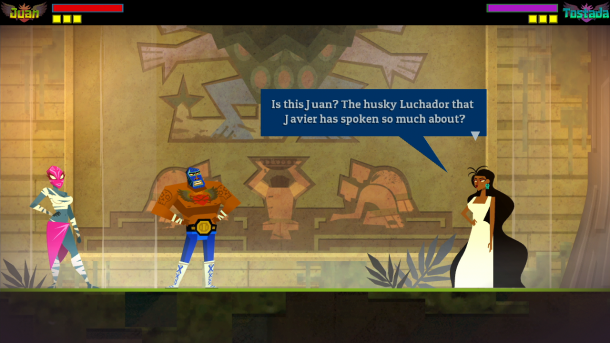He is a writer. He is a guy who plays games. He is The Perfect Strom. Guacamelee is a great game, so why is it making Steven feel so down? Like a mighty tempest, Steven will descend upon one of the video game industry’s most recent topics and rain down his thoughts.
[dropcap]T[/dropcap]he image I have of my half-middle-namesake and late grandfather, Grandpa Gordon, presents him as an old man breathing from an oxygen tank, sitting in front of a dining room window and swatting flies all day. I also remember that whenever we visited him, he would send my brother and I into the next room to get a box of oatmeal creme pies to share.
The only connection I ever drew between him and the motherland was a plate-shaped analog clock with Norwegian writing in place of actual numbers (I think it’s hanging in my parents’ bedroom now). It wasn’t until much later that I learned from my father — who, as the youngest sibling in his family by quite a large margin, is often quite laconic about his childhood — that Grandpa Gordon actually reveled in his Norwegianness. To his dying day, he continued to speak the language, eat that absolutely wretched concoction known as lutefisk and occasionally “break out the squeezebox” (that is, the accordion).
Growing up, I never saw any of that.
Perhaps he thought someone as young and “modern” as me wouldn’t have appreciated it. He’d have probably been right. As a stereotypically Lutheran/soon-to-be-atheist, I never cared much for church, which is where I was most often exposed to other people’s expatriate, Scandinavian elders and their much more public displays of North Dakotan culture (much of the upper-Midwest’s population is Norse, thanks to turn-of-the-century immigration regulations).
I absolutely loathed the smell of lutefisk and lefse; I despised the sounds of accordions and polka; I was mortified by the suffocating lack of self-awareness as laconic, teeth-grindingly polite population cracked Ole and Lena jokes; and I hated the stereotypically “Minnesota nice” culture, which had apparently spilled westward and inspired such a mortifying public representations of “my people” as the Coen Brothers’ Fargo. It made my blood boil every time I imagined this was how someone from a “real” state picture me or my family.
I may have expressed this embarrassment and with my grandfather at some point. I’m not entirely sure. I suppose it would account for his reticence in showing any of the parts of himself my father and his brothers and sisters apparently remember so well. It’s just as possible that he no longer felt up to it after age and decades of smoking finally caught up to him.
Sorry if it was the former rather than the latter, grandpa.
Over the years, perhaps to subconsciously make up for what I now recognize as my earlier self-loathing, I developed an interest in Scandinavian culture; a pride in viking lore, mythology, exploration, and real achievements. I grew to love true tales of viking valor, too busy fighting the elements to be the snarling barbarians Christianity eventually made them out to be in a (successful) bid to wipe out their religion.
I told myself “That, was my ancestors’ real legacy. It was not this smattering of ridiculously accented, passive-aggressive, unthinking cattle.”
I held that ridiculous, self-serious pride for a very long time. I suppose I still do. However, that loathing of “my modern people” never really went away.
Then, this week, I played a game called Guacamelee. It’s a ridiculous mash-up of stereotypically Hispanic cultural touchstones. Half of the characters — usually masked luchadores or Western movie “banditos” — are named after Mexican food. The other half play in mariachi bands, or malign their life-threatening plight as it forces them to miss their telenovelas. All the while, the entire cast lives under the threat of a Dia de los Muertos-themed apocalypse.
It’s an aesthetic I’ve always adored, long before Grim Fandango brought them to the world of video games — grounded, as it is, in a culture I barely understand, yet find infinitely fascinating. I don’t mean quaint, or ironic, mind you, but legitimately wonderful things that can be appreciated by everyone.
About an hour into the game, however, I asked myself if someone who actually grew up with these aspects of the world would feel the same way, or if their blood would heat up at yet another collection of silly cliches, like mine after hearing William H. Macy’s northern accent for the first time.
I realized then, that of course there would be at least one person, and just how ridiculous it was of me to enjoy those bizarre aspects of world when I couldn’t even accept my own.
I’m not saying that Guacamelee is offensive, quite the opposite, in fact. It’s a celebration of the most ridiculous aspects of a fascinating segment of popular culture, and shows that we don’t have to say we just “enjoy something ironically,” as evidenced by its much-maligned use of Reddit memes.
Life isn’t always somber and self-serious. It’s often quite ridiculous and stupid, and those are usually the parts worth enjoying the most, if we allow ourselves to do so.
For as much fun as I’m having with Guacamelee, it’s also brought on some regrets. I can’t help but wish I had played it 15 years ago, when Grandpa Gordon would have still been around to try and fail to teach me how to play the accordion and speak the language. I can read all the books and Wikipedia entries on Scandinavian folklore I want, but I’ll never get that chance again.




2 Comments